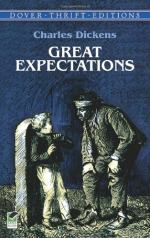To be sure, it was a deserted place, down to the pigeon-house in the brewery-yard, which had been blown crooked on its pole by some high wind, and would have made the pigeons think themselves at sea, if there had been any pigeons there to be rocked by it. But, there were no pigeons in the dove-cot, no horses in the stable, no pigs in the sty, no malt in the store-house, no smells of grains and beer in the copper or the vat. All the uses and scents of the brewery might have evaporated with its last reek of smoke. In a by-yard, there was a wilderness of empty casks, which had a certain sour remembrance of better days lingering about them; but it was too sour to be accepted as a sample of the beer that was gone — and in this respect I remember those recluses as being like most others.
Behind the furthest end of the brewery, was a rank garden with an old wall: not so high but that I could struggle up and hold on long enough to look over it, and see that the rank garden was the garden of the house, and that it was overgrown with tangled weeds, but that there was a track upon the green and yellow paths, as if some one sometimes walked there, and that Estella was walking away from me even then. But she seemed to be everywhere. For, when I yielded to the temptation presented by the casks, and began to walk on them. I saw her walking on them at the end of the yard of casks. She had her back towards me, and held her pretty brown hair spread out in her two hands, and never looked round, and passed out of my view directly. So, in the brewery itself — by which I mean the large paved lofty place in which they used to make the beer, and where the brewing utensils still were. When I first went into it, and, rather oppressed by its gloom, stood near the door looking about me, I saw her pass among the extinguished fires, and ascend some light iron stairs, and go out by a gallery high overhead, as if she were going out into the sky.
It was in this place, and at this moment, that a strange thing happened to my fancy. I thought it a strange thing then, and I thought it a stranger thing long afterwards. I turned my eyes — a little dimmed by looking up at the frosty light — towards a great wooden beam in a low nook of the building near me on my right hand, and I saw a figure hanging there by the neck. A figure all in yellow white, with but one shoe to the feet; and it hung so, that I could see that the faded trimmings of the dress were like earthy paper, and that the face was Miss Havisham’s, with a movement going over the whole countenance as if she were trying to call to me. In the terror of seeing the figure, and in the terror of being certain that it had not been there a moment before, I at first ran from it, and then ran towards it. And my terror was greatest of all, when I found no figure there.
Nothing less than the frosty light of the cheerful sky, the sight of people passing beyond the bars of the court-yard gate, and the reviving influence of the rest of the bread and meat and beer, would have brought me round. Even with those aids, I might not have come to myself as soon as I did, but that I saw Estella approaching with the keys, to let me out. She would have some fair reason for looking down upon me, I thought, if she saw me frightened; and she would have no fair reason.




